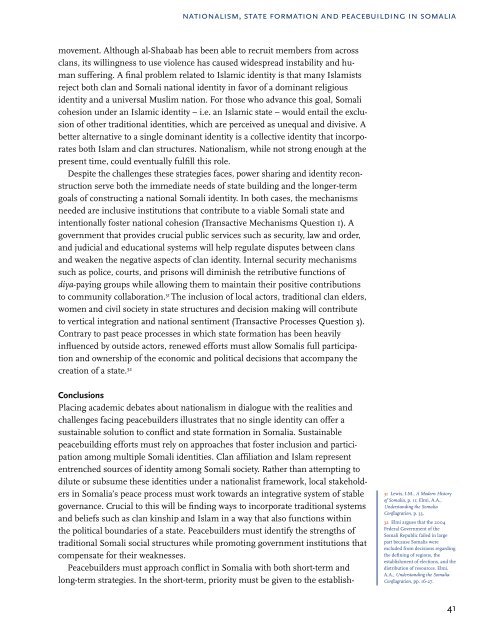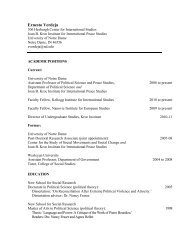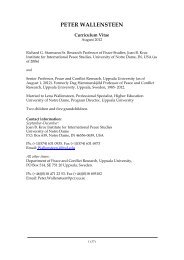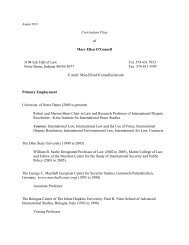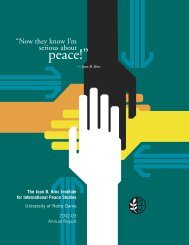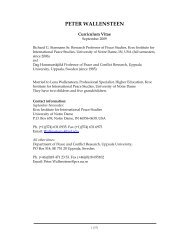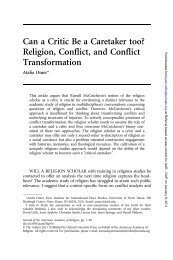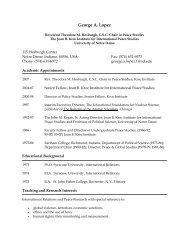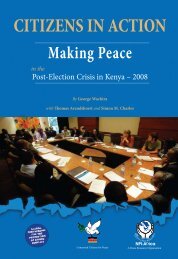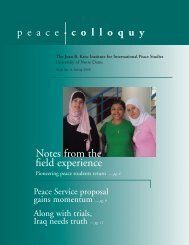Somalia: Creating Space for Fresh Approaches to Peacebuilding
Somalia: Creating Space for Fresh Approaches to Peacebuilding
Somalia: Creating Space for Fresh Approaches to Peacebuilding
Create successful ePaper yourself
Turn your PDF publications into a flip-book with our unique Google optimized e-Paper software.
nationalism, state <strong>for</strong>mation and peacebuilding in somalia<br />
movement. Although al-Shabaab has been able <strong>to</strong> recruit members from across<br />
clans, its willingness <strong>to</strong> use violence has caused widespread instability and human<br />
suffering. A final problem related <strong>to</strong> Islamic identity is that many Islamists<br />
reject both clan and Somali national identity in favor of a dominant religious<br />
identity and a universal Muslim nation. For those who advance this goal, Somali<br />
cohesion under an Islamic identity – i.e. an Islamic state – would entail the exclusion<br />
of other traditional identities, which are perceived as unequal and divisive. A<br />
better alternative <strong>to</strong> a single dominant identity is a collective identity that incorporates<br />
both Islam and clan structures. Nationalism, while not strong enough at the<br />
present time, could eventually fulfill this role.<br />
Despite the challenges these strategies faces, power sharing and identity reconstruction<br />
serve both the immediate needs of state building and the longer-term<br />
goals of constructing a national Somali identity. In both cases, the mechanisms<br />
needed are inclusive institutions that contribute <strong>to</strong> a viable Somali state and<br />
intentionally foster national cohesion (Transactive Mechanisms Question 1). A<br />
government that provides crucial public services such as security, law and order,<br />
and judicial and educational systems will help regulate disputes between clans<br />
and weaken the negative aspects of clan identity. Internal security mechanisms<br />
such as police, courts, and prisons will diminish the retributive functions of<br />
diya-paying groups while allowing them <strong>to</strong> maintain their positive contributions<br />
<strong>to</strong> community collaboration. 31 The inclusion of local ac<strong>to</strong>rs, traditional clan elders,<br />
women and civil society in state structures and decision making will contribute<br />
<strong>to</strong> vertical integration and national sentiment (Transactive Processes Question 3).<br />
Contrary <strong>to</strong> past peace processes in which state <strong>for</strong>mation has been heavily<br />
influenced by outside ac<strong>to</strong>rs, renewed ef<strong>for</strong>ts must allow Somalis full participation<br />
and ownership of the economic and political decisions that accompany the<br />
creation of a state. 32<br />
Conclusions<br />
Placing academic debates about nationalism in dialogue with the realities and<br />
challenges facing peacebuilders illustrates that no single identity can offer a<br />
sustainable solution <strong>to</strong> conflict and state <strong>for</strong>mation in <strong>Somalia</strong>. Sustainable<br />
peacebuilding ef<strong>for</strong>ts must rely on approaches that foster inclusion and participation<br />
among multiple Somali identities. Clan affiliation and Islam represent<br />
entrenched sources of identity among Somali society. Rather than attempting <strong>to</strong><br />
dilute or subsume these identities under a nationalist framework, local stakeholders<br />
in <strong>Somalia</strong>’s peace process must work <strong>to</strong>wards an integrative system of stable<br />
governance. Crucial <strong>to</strong> this will be finding ways <strong>to</strong> incorporate traditional systems<br />
and beliefs such as clan kinship and Islam in a way that also functions within<br />
the political boundaries of a state. Peacebuilders must identify the strengths of<br />
traditional Somali social structures while promoting government institutions that<br />
compensate <strong>for</strong> their weaknesses.<br />
Peacebuilders must approach conflict in <strong>Somalia</strong> with both short-term and<br />
long-term strategies. In the short-term, priority must be given <strong>to</strong> the establish-<br />
31 Lewis, I.M., A Modern His<strong>to</strong>ry<br />
of <strong>Somalia</strong>, p. 11; Elmi, A.A.,<br />
Understanding the <strong>Somalia</strong><br />
Conflagration, p. 33.<br />
32 Elmi argues that the 2004<br />
Federal Government of the<br />
Somali Republic failed in large<br />
part because Somalis were<br />
excluded from decisions regarding<br />
the defining of regions, the<br />
establishment of elections, and the<br />
distribution of resources. Elmi,<br />
A.A., Understanding the <strong>Somalia</strong><br />
Conflagration, pp. 16-27.<br />
41


